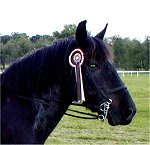 |
 |
|
|
|
Equine infectious anaemia (EIA) has been detected in two horses in Wiltshire following importation from Romania via Belgium. (January 2010) The premises are currently under restriction and the two infected horses will be humanely destroyed in line with existing regulations. The other horses on the premises will be subject to epidemiological investigation in the coming weeks. A further two horses have also been under investigation and test results have proved negative. The animals arrived in a group of 10 horses, nine of which originated from Romania and one from Belgium. The nine Romanian horses were tested for EIA as part of routine post-import testing. Seven horses all tested negative. The horse that originated in Belgium is due to be tested shortly. Chief Veterinary Officer, Nigel Gibbens said: "This is the first case of equine infectious anaemia infected animals being imported into Great Britain since 1976 and shows the success of our post import testing regime. These were apparently healthy horses carrying a notifiable disease that we are keen to keep out of Great Britain. After considering the risk I have decided to take appropriate action and humanely destroy these two horses that tested positive." Equine Infectious Anaemia (EIA) is a virus disease of horses which causes intermittent fever, anaemia, emaciation and death. It can be transmitted by the exchange of blood by biting insects and occurs typically in low-lying swampy areas - hence its common name "Swamp Fever"
As a notifiable disease iunder section 88 of the Animal Health Act 1981 it must be reported. This disease occurs in horses, mules and donkeys. Animals may be acutely, chronically or subclinically affected. The incubation period is variable, from a matter of days to a few months but generally one to three weeks. Antibodies usually develop seven to 14 days after infection and last for life. For an animal testing positively
for EIA, the only course of action is to humanely put it down.
This may be for the welfare of the affected horse, but also to
protect other horses from infection. Once infected, horses are
infected for life and can pose a risk to other horses in close
proximity. For further information and advice
visit |
(c) Native Ponies Online 2009